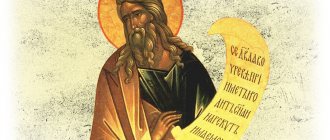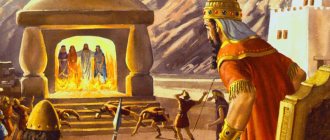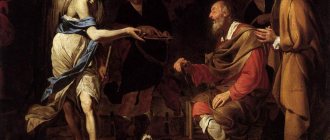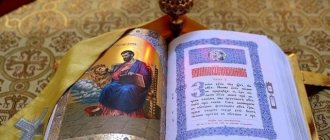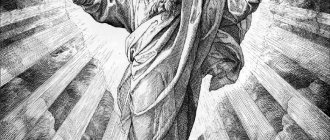Book of Wisdom of Solomon read, listen online
The Book of the Wisdom of Solomon consists of 19 chapters, each of which you can read or listen to online
Compositionally, the Book of Wisdom of Solomon can be divided into 2 parts:
Chapters 1 – 6 . The author calls on believers to be wise and practice virtue, as this is useful in earthly life and will count in the afterlife.
Chapters 7 – 19 . The author gives examples of Divine Wisdom. The period described is the exodus from Egypt and a 40-year wandering.
Birth of a legend
Thanks to archaeological (including underwater) excavations on the “Island of the Pharaohs,” a complex of port facilities combined with a natural harbor was found here back in 1960–1980. Perhaps it was on this site that the Phoenicians built Ezion-Gever (in the Russian synodal translation, Ezion-Gever).
If you believe the Third Book of Kings, the seaport in the area of the modern Israeli city of Eilat and the ships were built by Phoenician craftsmen at the expense of Solomon. The port was first built for the Egyptians, and then restored or expanded for Solomon, who, with the king of the Phoenician port city-state of Tire, Hiram, organized a joint expedition to the country of Ophir.
The main commodity of maritime transport was precious metals, although not only: “the king’s ships went to Tarshish with the servants of Hiram, and every three years the ships returned from Tarshish and brought gold and silver, ivory, monkeys and peacocks” (2 Chronicles 9: 21).
The learned pedants were not too lazy to count the 420 talents of gold delivered from Ophir to King Solomon, mentioned in the 9th chapter of the Third Book of Kings, receiving as much as 14.4 tons of yellow metal. Instead of God, someone read about the golden calf, and things got crazy. They began to look for the country of Ophir, Tarshish or Tarshish.
Writing language. Time of writing and authorship.
The Book of the Wisdom of Solomon was written in Greek with the presence of Hebraisms, which indicate that the author of the text was a Jew. Some researchers believe that the text was written in Hebrew or Aramaic, and only then translated into Greek, but this version is becoming less and less popular, since the text is replete with colorful wordplay in Greek and reflects the Greek linguistic system. This indicates that Greek is the original language of the text.
It is difficult to say whether the author relied on any ancient records of Solomon's thoughts in Hebrew or Aramaic when writing. The Greek text of the Book of Wisdom of Solomon is preserved in its best form in the copies of the Vatican Codex. Among the ancient translations, the Armenian translation also enjoys special authority. Latin, ancient Italian, Syriac, Arabic and Slavic translations are not of particular value, since they are done very freely.
Regarding issues of authorship , the text of the book indicates Solomon as the author. However, all researchers agree that this is just an artistic move. The author of the book is unknown, most likely the book was written by an Egyptian Jew who lived during the Ptolemaic era. Time of writing – III – II centuries. BC. The author had a good theological education and understood Greek philosophy.
Tarshish
Tarshish comes from the Akkadian rushashu - “to heat”, “to melt” and means “smelter”. In the Book of the Prophet Jeremiah it is written that silver sheets were delivered from Tarshish.
“The location of Tarshish is controversial,” according to the Electronic Jewish Encyclopedia website. - Many researchers conclude that Tarshish is a Mediterranean port, and identify it with Tarsus (in the region of Cilicia in the south of Asia Minor) or Tartessos, which in the “History” of Herodotus and in the works of Strabo and Pliny is placed on the Iberian (now Iberian) Peninsula to the west from the Pillars of Hercules (Strait of Gibraltar). The latter assumption is more reasonable, since Tartessus was a Phoenician colony, and in Isa. 23:1, 6, 10, 14 and Ex. 17:12, 25 Tarshish is mentioned in connection with the Phoenician city of Tzor (Tyre); In addition, in ancient times, deposits of various ores, as well as chrysolite, were mined near Tartessus.”
However, Tarshish could be located in the following places where there were Phoenician colonies and ores were mined:
- on the island of Sardinia;
- in Cilicia (now Türkiye);
- in North Africa (in the territory of modern Tunisia, where Carthage was);
- on the Red Sea coast;
- on the coast of the Indian Ocean.
The Authority of the Book of Wisdom of Solomon.
The Book of Wisdom of Solomon is not found in the Jewish and Orthodox canons. The book contains historical and doctrinal inconsistencies. Doctrinal inconsistencies include the following ideas in the book:
- The reasons for the source of sin in the biological structure of the human body,
- Antagonism between physicality and spirituality (this idea is close to the philosophy of Plato),
- The doctrine of the pre-existence of the soul,
- The formation of the world from “unshaped” matter.
It should be noted that in many ways, the book of the Wisdom of Solomon is close to the philosophical teachings of Plato, Philo, Diogenes Laertius and other Greek philosophers. Moreover, the terminology of the book is more philosophical than theological.
Historical inconsistencies include the following:
- Attribution of authorship to Solomon in the text,
- The description of some Egyptian plagues does not find factual evidence in the canonical texts.
However, all these inconsistencies do not detract from the merits of the Book of Wisdom of Solomon. The book provides an explanation of the Old Testament teaching about the afterlife of the righteous and sinners. The book gives many examples of observing Christian morality. The book contains many instructive thoughts. The Fathers of the Church called the Book of Wisdom of Solomon “a treasury of virtues.”
King Solomon - historical figure or myth
The son of David and Bathsheba, who is described not only in the Old Testament and the Koran, in a great variety of Jewish, Arab and Ethiopian legends, as well as in the treatise of the Roman historian of Jewish origin Josephus, is recognized as a historical figure, but archaeological evidence of the existence of Shlomo has not been found. Just as no evidence has been found of the vast and prosperous kingdom described in the Bible.
Judging by the excavations, Jerusalem during the time of King Solomon did not look like a stunning big city. The verdict is not final, field work continues. There will still be sensations. So far, historians and archaeologists understand: on the territory of present-day Israel in the tenth century BC there was a single Jewish kingdom. It is also not possible to determine its boundaries.
Three parts
The book is divided into three main sections: the first (IV chapter) says that only Wisdom can become a guide to achieving true blessed immortality, despite the false teachings of the Jews who denied it.
The second (VI-IX chapters) part is devoted to the essence of the teaching, its origin, as well as the meaning of possessing such higher knowledge and basic conditions in aspects of their achievement.
The third part (X-XIX chapters) is a historical example of the fact that only those people who possess this Wisdom can become happy. Ignorance of it, loss or rejection leads any nation to degradation and death (like the Egyptians and Canaanites).
Content
The main theme of the book is the doctrine of Wisdom from two sides, based on the most famous philosophical teachings. The first is objective reality, not given to us in sensation. The second is subjective reality, perceived in sensations from an objective point of view.
In this case, there is the simplest example: there is God in the world. This is an objective reality (so to speak, an axiom from a mathematical point of view that does not require proof), which cannot be touched with hands or felt on a physical level. His Wisdom is reflected directly in our soul. As for the subjective, this is each person’s personal attitude towards God and an understanding of what He offers to each believer in Him on a spiritual level.
Old Testament - [Book of Wisdom of Solomon]
[Book of Wisdom of Solomon]
Chapter 1
1 Love justice, O judges of the earth, think rightly about the Lord, and seek Him with simplicity of heart,
2 For He is found by those who do not tempt Him, and He is not found by those who do not believe Him.
3 For unjust reasoning separates one from God, and the testing of His power will expose the foolish.
4 Wisdom will not enter into an evil soul, nor will it dwell in a body enslaved to sin,
5 For the Holy Spirit of wisdom will shun wickedness and turn away from foolish speculations, and will be ashamed of the approaching unrighteousness.
6 A loving spirit is wisdom, but it will not leave unpunished the one who blasphemes with his lips, because God is the witness of his inner feelings and the true viewer of his heart and the hearer of his tongue.
7 The Spirit of the Lord fills the world and, being all-encompassing, knows every word.
8 Therefore no one who speaks a lie will hide himself, and the judgment that condemns him will not pass away.
9 For the thoughts of the wicked will be tested, and his words will come up to the Lord to reprove his iniquities;
10 For the ear of jealousy hears everything, and murmuring cannot be hidden.
11 Therefore, beware of useless murmuring and beware of a slanderous tongue, for even a secret word will not go in vain, and slandering lips kill the soul.
12 Do not hasten death by the errors of your life, and do not attract destruction to yourself by the works of your hands.
13 God did not create death and does not rejoice in the destruction of the living,
14 for He created everything for existence, and everything in the world is salvific, and there is no harmful poison, nor is there any kingdom of hell on earth.
15 Righteousness is immortal, but unrighteousness causes death:
16 The wicked attracted her with both hands and words, considered her a friend and wasted away, and made a covenant with her, for they were worthy to be her lot.
Chapter 2
1 Those who think wrongly said to themselves: “Our life is short and sad, and there is no salvation for man from death, and they do not know that anyone will free him from hell.
2 We were born by chance and afterward we will be like those who never were: the breath in our nostrils is smoke, and the word is a spark in the movement of our heart.
3 When it is extinguished, the body turns to dust, and the spirit dissipates like liquid air;
4 And our name will be forgotten in time, and no one will remember our deeds; and our life will pass like the trace of a cloud and dissipate like fog, dispersed by the rays of the sun and aggravated by its warmth.
5 For our life is the passing of a shadow, and we have no return from death: for a seal has been set, and no one returns.
6 Let us enjoy real blessings and hasten to enjoy the world as youth;
7 let us be filled with expensive wine and incense, and let the spring blossom of life not pass us by;
8 Let us be crowned with rose flowers before they wither;
9 Let none of us deprive ourselves of sharing in our enjoyment; Let us leave traces of joy everywhere, for this is our share and our lot.
10 Let us oppress the poor righteous, we will not spare the widow, and we will not be ashamed of the old man’s many years of gray hair.
11 Let our strength be the law of righteousness, for weakness is useless.
12 Let us make feats for the righteous, for he is a burden to us and opposes our deeds, reproaches us for sins against the law and reproaches us for the sins of our upbringing;
13 declares himself to have the knowledge of God and calls himself the son of the Lord;
14 He is before us as a reproof of our thoughts.
15 It is hard for us to look at him, for his life is not like the life of others, and his ways are different:
16 He considers us an abomination and shuns us from our ways as from uncleanness; he rejoices at the death of the righteous and vainly calls God his father.
17 We will see whether his words are true, and we will test what his outcome will be;
18 For if this righteous man is the son of God, then God will protect him and deliver him from the hand of his enemies.
19 Let us test him with insult and torment, so that we may know his humility and see his gentleness;
20 We will condemn him to a dishonorable death, for, as he said, he will be taken care of.”
21 So they reasoned, and were mistaken; for their malice has blinded them,
22 And they did not know the mysteries of God, did not expect the reward of holiness, and did not consider the souls of the blameless worthy of reward.
23 God created man for incorruptibility and made him the image of His eternal being;
24 But through the envy of the devil death entered the world, and those who belong to his inheritance experience it.
Chapter 3
1 But the souls of the righteous are in the hand of God, and no torment will touch them.
2 In the eyes of the foolish they seemed dead, and their outcome was considered destruction,
3 and the departure from us is destruction; but they are at peace.
4 For, although they are punished in the eyes of people, their hope is full of immortality.
5 And although they were punished a little, they will be greatly favored, because God tested them and found them worthy of Him.
6 He tested them like gold in the furnace and accepted them as a perfect sacrifice.
7 When they are rewarded, they will shine like sparks running along a stalk.
8 They will judge the nations and rule over the nations, and the Lord will reign over them forever.
9 Those who trust in Him will know the truth, and those who are faithful in love will abide with Him; for grace and mercy are with His saints and providence for His elect.
10 But the wicked, as they thought, will suffer punishment because they despised the righteous and departed from the Lord.
11 For those who despise wisdom and instruction are wretched, and their hope is vain, and their labors are fruitless, and their works are useless.
12 Their wives are foolish, and their children are wicked; cursed is their generation.
13 Blessed is the barren, undefiled, who has not known an iniquitous bed; she will receive fruit at the reward of holy souls.
14 Blessed is the eunuch who has committed no iniquity with his hand or thought evil against the Lord, for he will be given the special grace of faith and a most acceptable lot in the temple of the Lord.
15 The fruit of good labors is glorious, and the root of wisdom endures.
16 The children of adulterers will be imperfect, and the seed of the wicked bed will disappear.
17 Even if they live long, they will be considered nothing, and their late old age will be without honor.
18 But if they die soon, they will have no hope or comfort on the day of judgment;
19 For terrible is the end of an unrighteous generation.
Chapter 4
1 Better is childlessness with virtue, for the memory of it is immortal: it is recognized by both God and people.
2 When it is present, they imitate it, and when it departs, they strive for it: and in eternity, crowned, it triumphs, as having won victory through immaculate deeds.
3 But the fertile multitude of the wicked will not profit, and the adulterous branches will not take root deep and reach an unshakable foundation;
4 And although the branches turn green for a while, they, not having firmness, are shaken by the wind and are uprooted by a gust of wind;
5 weak branches will be broken, and their fruit will be useless, unripe for food and good for nothing;
6 for children born from lawless cohabitation are witnesses of depravity against their parents when they are interrogated.
7 But the righteous, even if he dies early, will have peace,
8 For honest old age is not measured by longevity, nor is it measured by the number of years:
9 Wisdom is gray hair for men, and a blameless life is the age of old age.
10 Because he was well-pleasing to God, he was beloved, and because he lived among sinners, he was put to rest,
11 He was caught, lest malice change his mind, or deceit deceive his soul.
12 For exercise in wickedness darkens what is good, and the excitement of lust corrupts a gentle mind.
13 Having reached perfection in a short time, he completed many years;
14 For his soul was pleasing to the Lord, therefore he hastened from the midst of wickedness. But people saw it and didn’t understand, didn’t even think about it.
15 that grace and mercy are with His saints and providence for His elect.
16 The righteous, when he dies, will condemn the living wicked, and the youth that soon reaches perfection will condemn the long old age of the unrighteous;
17 For they will see the end of the wise man and will not understand what the Lord has determined about him and why he has placed him in safety;
18 They will see and destroy it, but the Lord will laugh at them;
19 And after this they will be a dishonorable corpse and a disgrace among the dead forever, for He will cast them down dumb and remove them from their foundations, and they will be completely desolate and will be in sorrow, and their memory will perish;
20 In the consciousness of their sins they will stand in fear, and their iniquities will condemn them to their own face.
Chapter 5
1 Then the righteous man will stand with great boldness in the presence of those who insulted him and despised his exploits;
2 When they saw it, they would be troubled with great fear and amazed at the surprise of his salvation.
3 and, repenting and sighing from the oppression of the spirit, they will say to themselves: “This is the same one who was once a mockery and a byword for us.
4 Fools, we considered his life to be madness and his death dishonorable!
5 How then is he numbered among the sons of God, and his lot with the saints?
6 So we have gone astray from the path of truth, and the light of righteousness did not shine on us, and the sun did not shine on us.
7 We were filled with works of iniquity and destruction, and we walked through impassable deserts, but we did not know the way of the Lord.
8 What benefit has arrogance brought us, and what has wealth brought us with vainglory?



